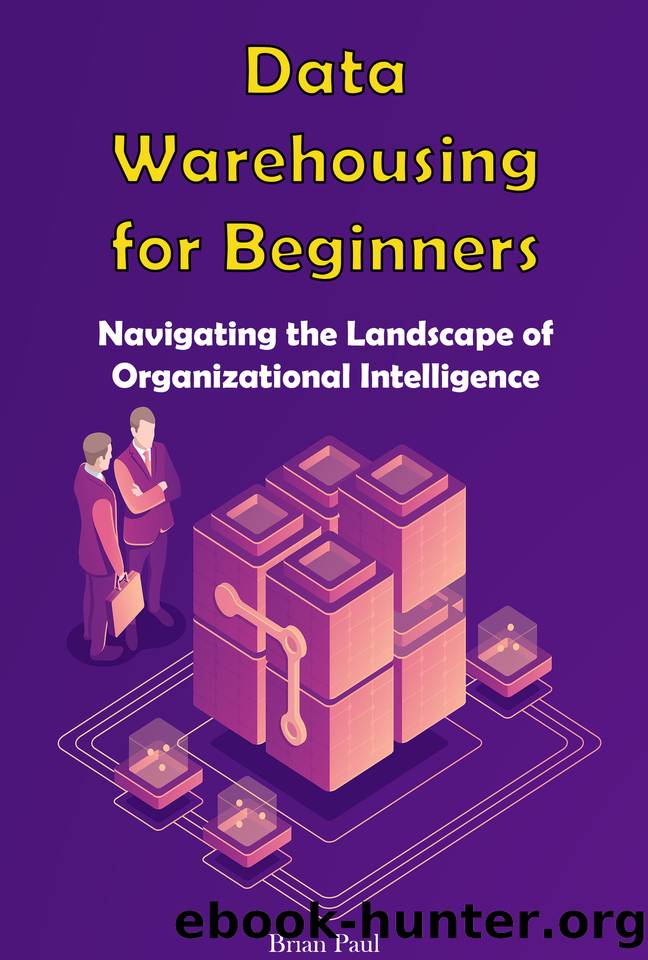Data Warehousing for Beginners: Navigating the Landscape of Organizational Intelligence by Paul Brian

Author:Paul, Brian
Language: eng
Format: epub
Published: 2023-12-27T00:00:00+00:00
Chapter 7: Emerging Trends in Data Warehousing
Cloud-Based Data Warehousing: Advantages and Challenges
Cloud-based data warehousing has become increasingly popular as organizations seek scalable, flexible, and cost-effective solutions for managing and analyzing large volumes of data. This approach involves storing and processing data in cloud environments rather than traditional on-premises data warehouses. While cloud-based data warehousing offers several advantages, it also presents unique challenges.
Advantages of Cloud-Based Data Warehousing:
Scalability: Cloud-based data warehouses provide on-demand scalability, allowing organizations to easily adjust computing resources based on their changing data processing needs. This ensures optimal performance during peak usage periods and cost savings during periods of lower demand.
Cost Efficiency: With cloud-based solutions, organizations can adopt a pay-as-you-go model, paying only for the resources they consume. This eliminates the need for significant upfront investments in hardware and infrastructure, making data warehousing more cost-efficient, particularly for smaller or rapidly growing businesses.
Flexibility and Agility: Cloud-based data warehouses offer greater flexibility in terms of data storage and processing. Users can quickly provision and de-provision resources, experiment with new tools and technologies, and adapt to evolving business requirements more easily than with traditional on-premises solutions.
Global Accessibility: Cloud-based data warehouses facilitate global accessibility to data. Teams distributed across different locations can access and analyze data seamlessly, promoting collaboration and ensuring that decision-makers have real-time insights, regardless of their geographic location.
Integration with Cloud Ecosystem: Cloud-based data warehouses often integrate seamlessly with other cloud services and tools. This allows organizations to leverage a broader ecosystem for data analytics, machine learning, and business intelligence, creating a more comprehensive and interconnected data environment.
Challenges of Cloud-Based Data Warehousing:
Data Security Concerns: Security is a primary concern when it comes to cloud-based data warehousing. While cloud providers implement robust security measures, organizations must also ensure the proper configuration of access controls, encryption, and compliance with data protection regulations to safeguard sensitive information.
Data Transfer and Latency: Transferring large volumes of data to and from the cloud can be time-consuming and may introduce latency issues. Organizations must carefully plan data migration strategies to minimize disruptions and optimize data transfer speeds.
Vendor Lock-In: Moving data and applications to the cloud often involves a degree of vendor lock-in, as transitioning between cloud providers can be complex. Organizations should carefully consider the long-term implications and plan for potential migrations or multi-cloud strategies to mitigate vendor lock-in risks.
Cost Management: While cloud-based data warehousing can be cost-effective, it requires effective cost management. Organizations need to monitor resource usage, implement cost controls, and optimize their infrastructure to avoid unexpected expenses.
Data Governance and Compliance: Maintaining data governance and compliance becomes more complex in the cloud, especially when dealing with sensitive or regulated data. Organizations must adhere to data protection regulations, implement robust governance policies, and ensure compliance with industry standards.
Cloud-based data warehousing offers numerous advantages in terms of scalability, cost efficiency, flexibility, and global accessibility. However, addressing challenges related to security, data transfer, vendor lock-in, cost management, and compliance is crucial for organizations to fully realize the benefits of this modern data management approach.
Integration with Big Data: Hadoop, Spark,
Download
This site does not store any files on its server. We only index and link to content provided by other sites. Please contact the content providers to delete copyright contents if any and email us, we'll remove relevant links or contents immediately.
Exploratory Data Analysis with Python Cookbook by Ayodele Oluleye(1116)
Mastering PostgreSQL 15 - Fifth Edition by Hans-Jürgen Schönig(406)
Pandas for Everyone: Python Data Analysis, 2nd Edition by Daniel Y. Chen(250)
Apache Hadoop 3 Quick Start Guide by Hrishikesh Karambelkar(247)
Learn SQL with MySQL: Retrieve and Manipulate Data Using SQL Commands with Ease by Ashwin Pajankar(236)
Deploy Node.js on GCP: A comprehensive guide to deploying Node.js on Google Cloud Platform by Jonathan Lin(235)
Intermediate Python by Oswald Campesato(159)
Leveling Up with SQL by Mark Simon(157)
Configuring Sales and Distribution in SAP ERP by Unknown(149)
Learning Data Science by Sam Lau(144)
Kimmel N. The Python Bible for Beginners. A Step-By-Step Guide...2023 by Unknown(112)
SQL Query Design Patterns and Best Practices by Steve Hughes & Dennis Neer & Dr. Ram Babu Singh & Shabbir H. Mala & Leslie Andrews & Chi Zhang(108)
SQL in 7 Days: A Quick Crash Course in Manipulating Data, Databases Operations, Writing Analytical Queries, and Server-side Programming by Alex Bolenok(107)
Python Data Science by Scratch Austin(104)
Databricks Lakehouse Platform Cookbook: 100+ recipes for building a scalable and secure Databricks Lakehouse by Dr. Alan L. Dennis(101)
Big Data for Big Decisions by Krishna Pera(95)
Pandas Basics by Oswald Campesato(92)
IOS 17 App Development for Beginners: Get started with iOS app development using Swift 5.9, SwiftUI, and Xcode 15 by Kulsreshtha Arpit;(92)
Database Fundamentals (Mastering Database Management Series) by Edet Theophilus(91)
